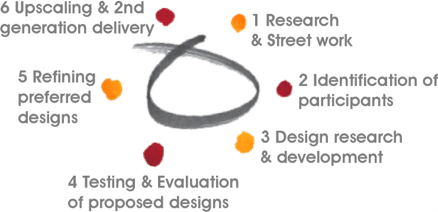By Tasmi Quazi & Richard Dobson
Paper presented at the eThekwini-University Research Symposium on 19 September 2012
NPO Asiye eTafuleni (AeT) was commissioned by eThekwini Municipality’s Imagine Durban Project to implement a pilot project to test ways of improving the livelihoods of existing waste pickers operating in Durban, South Africa. By referring to this case study, this paper will expound upon the critical opportunities accrued by the inclusion of waste pickers into national and local government plans. The pilot project focussed on cardboard recycling which is one of the major recycling activities in the inner city.
A major objective of the research was to understand the existing recycling chains in the inner city, including a survey of the socio-economic backgrounds and situational analyses of waste pickers. The process commenced with desktop research and one-on-one interviews with a range of stakeholders in the sector identified through the prior institutional experience of the founders of AeT and snowballing method. Thereafter, two specific groups were identified as case study participants, and AeT engaged in action-research through practical work experience and observation studies with the waste pickers in their working environments. This was aimed at informing design interventions developed alongside waste pickers. This consequently led to testing custom-made trolleys and a range of other strategies in response to the identified needs of the waste pickers.

The government’s green economy strategy is intended to support decent jobs which could be achieved through the inclusion of all forms of recycling. This project has contributed to a better understanding of the role of informality and the integrated urban management needs within the recycling sector. The key elements for advancing this approach would be a clear national policy and implementation strategy, the integration of waste pickers in specific local government programmes, specifically in the provision of enabling urban infrastructure and equipment to enhance their contributions, and lastly multifaceted partnerships between government, private sector and waste pickers.

